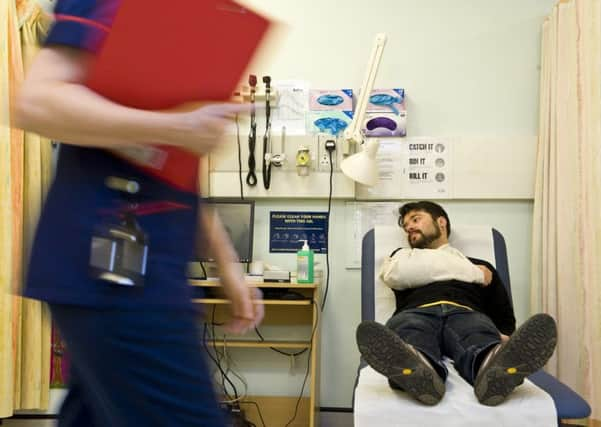Union hits out over pressure on ‘overworked’ NHS workers


The annual NHS Scotland staff survey found 33 per cent of all employees thought their department had enough staff, falling to 26 per cent for nurses and midwives and 12 per cent for ambulance personnel.
SNP ministers are facing criticism for undervaluing Scotland’s NHS workforce after almost half of the staff said they are unable to do their jobs properly because of a growing pressure on their time.
Advertisement
Hide AdAdvertisement
Hide AdJust 46 per cent of the 60,681 workers who completed the NHS Scotland staff survey said they felt they could meet all the conflicting demands on their time at work.
Ambulance workers felt under most strain with just 27 per cent stating that they were able to meet all the competing pressures during their working hours, while for nurses and midwives the figures was 39 per cent and 36 per cent for GPs.
Health union officials said the findings highlighted the “enormous pressure” on Scotland’s frontline NHS staff.
Royal College of Nursing (RCN) Scotland associate director Norman Provan said: “There are some areas of real concern. Only 26 per cent of nurses and midwives felt that there were enough staff to do their job properly; just a slight increase from last year’s figure of 25 per cent.
“This staff survey once again highlights the enormous pressure on all members of the multidisciplinary teams who deliver care to patients every day in hospitals and out in our communities.”
Scottish Labour public services spokesman Dr Richard Simpson said that he had been made aware of reports of NHS staff in tears and sick with stress as he accused the SNP government of letting down health workers.
Dr Simpson, a former GP, said: “Now more than ever we need a health service free at the point of use based on clinical need, not the ability to pay. Our NHS is our most valued public service and it needs to have the resources to deliver the care Scots need.
“Our NHS staff do incredible work every day but under the SNP government they are undervalued and overworked.
Advertisement
Hide AdAdvertisement
Hide Ad“We hear stories about staff in tears and sick with stress at the new flagship hospital in Glasgow. After eight years in government and a majority in parliament there are no excuses for the SNP on our NHS. But what we have seen from the SNP is a tendency to squeeze health spending in Scotland harder than even the Tories in England, whilst failing to manage our NHS.”
Meanwhile, the survey found that about a quarter (28 per cent) of all employees said they were always consulted about changes at work.
It also showed that 89 per cent of respondents said they were happy to go the extra mile in the workplace and 79 per cent of all staff said they felt they received the support they need from colleagues.
But Dr Peter Bennie, chair of British Medical Association (BMA) Scotland, said too many medical posts were still going unfilled.
He said: “Every vacant medical post in the health service puts additional strain on staff who have to attempt to plug the gaps in service.
“That is why the significant problems in recruiting and retaining doctors to posts in Scotland needs to be addressed as a matter of urgency.”
Liberal Democrat health spokesman Jim Hume MSP said: “If, as this survey shows, a quarter of staff could stop working in their health board over the next 12 months, it could be make or break for the organisation.
“Scottish Liberal Democrats are urging the Scottish Government take drastic action now.”
Advertisement
Hide AdAdvertisement
Hide AdHealth secretary Shona Robison said NHS staff numbers were at a record high, with increased student nursing and midwifery intakes, and £450,000 to be invested over the next three years in a scheme to encourage former nurses back into the profession.
She added: “It is welcome that staff remain committed to their roles, with almost nine out of ten willing to go the ‘extra mile’ at work. It is also promising that so many staff members have confidence and trust in their direct line manager, and get help and support from colleagues when needed.”